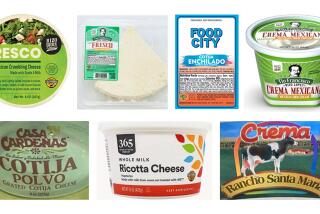Some neighbors say Sriracha factory’s smell is creating headaches

The city filed suit to suspend production of Sriracha hot sauce at the Huy Fong Foods factory, saying the odors from the plant are a public nuisance.
Jesse Bracamontes is one of the legions of Sriracha hot sauce fans who squirts the bright red paste of peppers, garlic and spices on all manner of foods: pizza, take-out Chinese and even a plain bowl of noodles.
But when the pungent Sriracha smell wafts into the frontyard of his Irwindale home, he says his nose runs and he feels a little sick.
“It feels a little like pepper spray,” he said.
Bracamontes lives a short walk from Sriracha’s bustling new plant in Irwindale, which can produce up to 200,000 bottles of the hot sauce each day. The company moved there last year in response to heavy global demand.
PHOTOS: Sriracha factory brews heat in Irwindale
But some neighbors say they are paying the price as Sriracha booms. They say the smell is making their eyes water and throats burn.
Now the city is demanding that the factory shut down until the problem is solved. Irwindale filed suit in Los Angeles County Superior Court on Monday against the sauce’s company Huy Fong Foods, alleging that the odor was a public nuisance and asking a judge to stop production.
Irwindale City Manager John Davidson said he had noticed the odor, both at City Hall and just outside the plant.
“It’s pretty strong,” he said.
Sriracha has emerged as the condiment of the moment. It was formulated in L.A.’s Chinatown by a Vietnamese Chinese immigrant decades ago and attracted a cult following. But over the last decade, the sauce’s popularity has exploded, accounting for more than $60 million in sales last year, according to the company.
It’s spawned a documentary, a food festival, a cookbook and even a special flavor of Lay’s potato chips. The company moved to the $40-million plant so it could triple its capacity, officials said.
Huy Fong officials said they were skeptical that the odor was as noxious as city officials claim.
David Tran, chief executive and founder, has offered to do what he can to control the odor and the company has twice added filters to its exhaust vents. But he says the chiles are pungent for a reason — it makes for a better sauce.
“If it doesn’t smell, we can’t sell,” Tran said. “If the city shuts us down, the price of Sriracha will jump a lot.”
The chile itself is a hybrid jalapeño pepper calibrated by Tran and a supplier for specific spice levels. It is ground fresh, not cooked or dried.
Chiles are offloaded onto a conveyor belt at the back of the building, where they are washed, then ground. Above the grinder, exhaust fans suck the chile-laden air into several filtered pipes that run all the way to the roof, where the peppery air is expelled.
Sergio Garcia, a 27-year-old machine supervisor, works near the unfiltered air all day without a breathing mask.
“It’s not so bad,” Garcia said. “You get used to it.”
A business- and industrial-heavy city, Irwindale is no stranger to smells, including some emanating from a dog food manufacturer — especially on an overcast day, said Lisa Bailey, the president of the Irwindale Chamber of Commerce. Also in Irwindale is the MillerCoors Brewery.
“But most people don’t consider that a bad odor. It’s like, ‘Oh, beer!’ ” Bailey said with a laugh.
Bailey said she got a tour of the Sriracha facility about three weeks ago, while chiles were being crushed. She said she wore a hair net but no mouth covering.
“I didn’t have any adverse reaction while I was there,” Bailey said. “No burning eyes, no throat constriction, and I’ve had that while cooking chiles at home.”
Bailey said she was surprised the city filed suit, adding she and her husband are aficionados of Sriracha.
“My husband pretty much uses it like ketchup,” Bailey said.
So far Huy Fong Foods’ factory has passed muster with air quality regulators. The South Coast Air Quality Management District got 11 complaints about odors related to the Irwindale plant — all since Oct. 21, including four Saturday and one Tuesday.
But Sam Atwood, a district spokesman, said the complaints couldn’t be confirmed after inspectors did “odor surveillance” of the area on two occasions.
“On both occasions, they could not detect any odor,” he said.
Atwood said that odors can be fleeting, depending on factors like the weather, and that deep marine layers can trap odors and pollutants close to the ground. But so far the district has no reason to take any action against Huy Fong Foods, he said.
Kathy Galaz, 66, said the smell is relatively mild. Galaz makes a spicy brand of salsa that makes her sister sneeze and cough, but both are undisturbed by the smell from the factory, which is visible from their front door.
“We walk the dog, we mow the lawn. It doesn’t bother us,” she said.
Thomas Serrato, 64, of Baldwin Park said it just smells like someone cooking chorizo.
“I knew what it was. It smelled like chili and that’s all there is to it,” he said. “It didn’t burn my eyes or anything.”
For years, Huy Fong Foods was based in Rosemead until it started winding down as it completes moving its operations to Irwindale. Odor was never an issue, said Rosemead City Councilman Steven Ly.
“Honestly, until you walk [into the factory], you couldn’t smell anything,” he said.
Rosemead City Manager Jeff Allred said his staff could not recall a single complaint against the company.
The development deal that brought Huy Fung foods to Irwindale was controversial at the time. The city used $11 million in money intended for affordable housing to buy the 23-acre parcel on Azusa Canyon Road, across the street from a giant gravel pit.
Then officials changed course and decided the land was not suitable for housing. At the time, Irwindale stood to benefit from having commercial development instead of housing development. That’s because redevelopment laws at the time allowed the city’s redevelopment agency to collect a larger share of property tax revenues from commercial projects.
But redevelopment was abolished in 2011, and much more of those property taxes now flow to the state, schools and county.
Davidson, the city manager, said Irwindale does not want Huy Fong Foods to leave.
“Our only desire is for them to take corrective actions to alleviate the public nuisance,” he said.
Across the street from the factory, Young Ja Whang, 68, runs the cash register at the Liquor Junior Market she owns with her husband. From 8 a.m. to 8 p.m., she leaves the door open and allows the scent of freshly ground chiles to waft into her store. She finds the scent mild, even a little pleasant.
“I’m an old lady and I have no problem with it,” Whang said. “Actually, we like it!”
More to Read
Sign up for Essential California
The most important California stories and recommendations in your inbox every morning.
You may occasionally receive promotional content from the Los Angeles Times.












